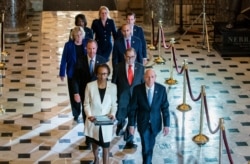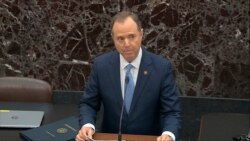U.S. President Donald Trump's lawyers on Monday assailed the impeachment case against him as a "dangerous perversion of the Constitution," asserting he did "absolutely nothing wrong" in pressing Ukraine to launch investigations to benefit himself politically.
The lawyers for the U.S. leader said Democratic lawmakers pushing for the impeachment of the Republican president and his removal from office were not trying to find the truth about Trump's Ukraine-related actions, but rather some way to overturn his 2016 election and interfere with his 2020 reelection campaign.
In a legal brief a day ahead of the first substantive session of Trump's impeachment trial in the Senate, the lawyers called the Democrats' case against him "a constitutional travesty" and said the Senate should swiftly acquit him of the two articles of impeachment he is facing. One alleges that he abused the presidency by pressing Ukrainian President Volodymyr Zelenskiy to investigate one of his top 2020 Democratic challengers, former Vice President Joe Biden, and the other that he obstructed Congress in its review of his Ukraine efforts.
Democratic lawmakers had earlier said it was clear that the "evidence overwhelmingly establishes" that Trump is guilty of both charges in the two articles of impeachment.
The Trump lawyers, in their 110-page filing, said that Trump was conducting normal foreign policy affairs in dealing with Zelenskiy.
They said he did not commit a crime, even though conviction of an impeached U.S. president and removal from office does not depend on a specific violation of a criminal law. Rather it is how the 100 members of the Senate, acting as jurors, interpret the standard for conviction set out in the U.S. Constitution, whether a president has committed "high crimes and misdemeanors."
No matter the legal arguments for and against Trump, he almost certainly will be acquitted by the Republican-majority Senate, where a two-thirds vote against him would be required for conviction and removal from office, just months ahead of his reelection bid in November. At least 20 of the 53 Republicans in the chamber would have to join all 47 Democrats to convict Trump, and no Republican has called for his ouster.
But Trump's impeachment trial is only the third such event in the nearly 2-1/2 centuries of U.S. history and the proceedings, overseen by Chief Justice John Roberts, will be fraught with uncertainty.
The White House is predicting Trump's acquittal within two weeks, but the trial could last much longer if Democrats succeed in persuading four Republicans to join them in calling for testimony from key Trump aides about the president's Ukraine-related actions.
Calling witnesses
The Democrats, over the objections of Senate Republican leader Mitch McConnell, want to hear testimony from former national security adviser John Bolton, acting White House chief of staff Mick Mulvaney and others about how Trump asked for investigations of Biden, his son Hunter Biden's work for a Ukrainian natural gas company, and a debunked conspiracy theory that Ukraine meddled in the 2016 election to undermine Trump's campaign. Trump's Ukraine efforts came at the same time he was temporarily withholding $391 million in military aid that Ukraine wanted to help fight pro-Russian separatists in eastern Ukraine.
Trump at various times has said he wants to call the Bidens as witnesses at his trial, along with the still-unidentified whistleblower who first disclosed that Trump in a July phone call asked Zelenskiy to launch the Biden investigations. But on Twitter Monday, he seemed averse to hearing testimony from Bolton, whom he ousted in September.
Democrats, Trump said, "didn’t want John Bolton and others in the House" to testify. "They were in too much of a rush. Now they want them all in the Senate. Not supposed to be that way!"
Democrats pushing for Trump's impeachment had sought testimony from Bolton and others in Trump's orbit, but the potential witnesses complied with the president's edict to not cooperate with the House investigation, although others ignored it and testified. Democratic lawmakers abandoned efforts to subpoena some witnesses out of fear that the legal fights over their testimony would extend for months and instead moved ahead to adopt the impeachment articles without hearing them testify under oath.
Bolton now says he is willing to testify at Trump's impeachment trial if he is subpoenaed by the Senate.
McConnell, the Senate majority leader, says he has enough Republican votes to push through rules for the impeachment trial that would hold off on a vote on whether to call witnesses until after House managers prosecuting the case against Trump have made their case and Trump's lawyers have presented his defense. At that point, McConnell says lawmakers could decide whether they want to hear witnesses or subpoena documents from the White House related to Trump's Ukraine actions.
Senate Democratic leader Chuck Schumer says he will press to try to include witnesses as part of the parameters adopted for the trial, but if McConnell's vote counting is accurate, Schumer stands to lose such a preliminary skirmish.
Trump, who almost daily ridicules the impeachment effort, tweeted Monday, "Cryin’ Chuck Schumer is now asking for 'fairness', when he and the Democrat House members worked together to make sure I got ZERO fairness in the House. So, what else is new?"
The Senate could also decide the pace of the trial. McConnell says he plans to convene it six days a week, but it is unclear how many hours a day the Senate will hear the case.
Weighing facts
Criminal defense lawyer Alan Dershowitz, one of the team of lawyers defending Trump, told CNN's "State of the Union" show on Sunday that he will tell senators that "even if the facts as presented are true, it would not rise to the level of impeachment" to convict Trump and oust him from office.
Congressman Adam Schiff, the leader of seven House impeachment managers, told ABC News' "This Week" show, "The facts aren't seriously contested, that the president withheld hundreds of millions of dollars in military aid to an ally at war with Russia, withheld a White House meeting that the president of Ukraine desperately sought to establish with his country and with his adversary the support of the United States in order to coerce Ukraine to helping him cheat in the next election."
Schiff added, "They really can't contest those facts. So the only thing really new about the president's defense is that they're now arguing that because they can't contest the facts that the president cannot be impeached for abusing the power of his office."
Trump eventually released the Ukraine military aid in September after a 55-day delay without Zelenskiy launching the Biden investigations. Republicans say that is proof that Trump did not engage in a reciprocal quid pro quo deal — the military aid in exchange for the investigations to help him politically.
One of Trump's staunchest Senate defenders, Senator Lindsey Graham, on the "Fox News Sunday" show, called the impeachment effort "a partisan railroad job. It's the first impeachment in history where there's no allegation of a crime by the president."
He said if Democrats demand to hear testimony from Bolton, Mulvaney and others, Trump will seek to invoke executive privilege against their testimony to protect the sanctity of private White House conversations.
"Clearly to me any president would ask for executive privilege regarding these witnesses," Graham said, adding that if they were that important to the House case against Trump, Democrats should have pursued their testimony during the House investigation.
Two other presidents — Andrew Johnson in the mid-19th century and Bill Clinton two decades ago — were impeached by the House but acquitted in Senate trials and remained in office. A fourth U.S. president, Richard Nixon in the mid-1970s, faced almost certain impeachment in the Watergate political scandal, but resigned before the House acted.







